Meatless Filipino Lent food
Coming up with the whole family’s meals every day is already a challenge to take on, more so now if you have to cook food for the Lenten season. And since the Philippines is predominantly Catholic, for a lot of us, the start of Lent means the beginning of a 40-day abstinence from meat and alcohol, in preparation for the Holy Week in April.
So, to give you an idea on what meals to prepare, we list a couple of Filipino dishes and meat alternatives you can include in your Lent-safe food selection.
Table of Contents
– Fish-based dishes for Holy Week –
1. Bangus sinigang – milkfish in a tamarind-based broth
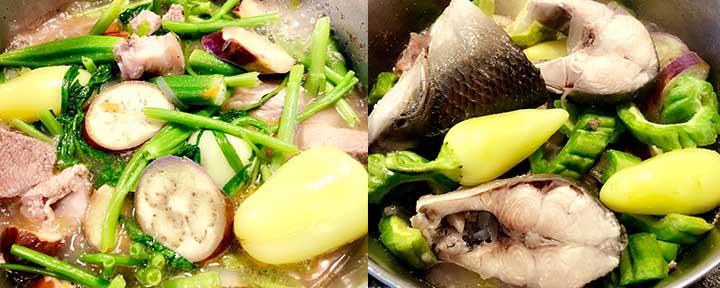 Bangus sinigang
Bangus sinigang
Image credit: @ginamarasigan1
The beauty of sinigang lies in its simplicity. It’s just meat, some veggies, and a sour broth; but it never fails to make you feel all warm and fuzzy inside. And since it’s a time of abstinence, the bangus sinigang is the best way to enjoy sinigang without pork.
Cooking this Lent food dish is simple. You’ll just put the bangus (milkfish), quartered tomatoes, red onion, and radish into a pot of water. Next, you’ll add in some siling haba (finger chilis), mix in the paste or powdered tamarind, then let it all simmer until cooked. And lastly, add salt to taste, and kangkong (water spinach) before serving.
You may notice a difference in the way you cook your sinigang compared to the recipe shared above, although that’s the thing about Filipino dishes— you can add or remove ingredients and have variation in the preparation, but at the end, the sinigang’s core characteristic is its heart-warming savory sourness.
2. Fish steak – deep meaty flavor without beef or pork
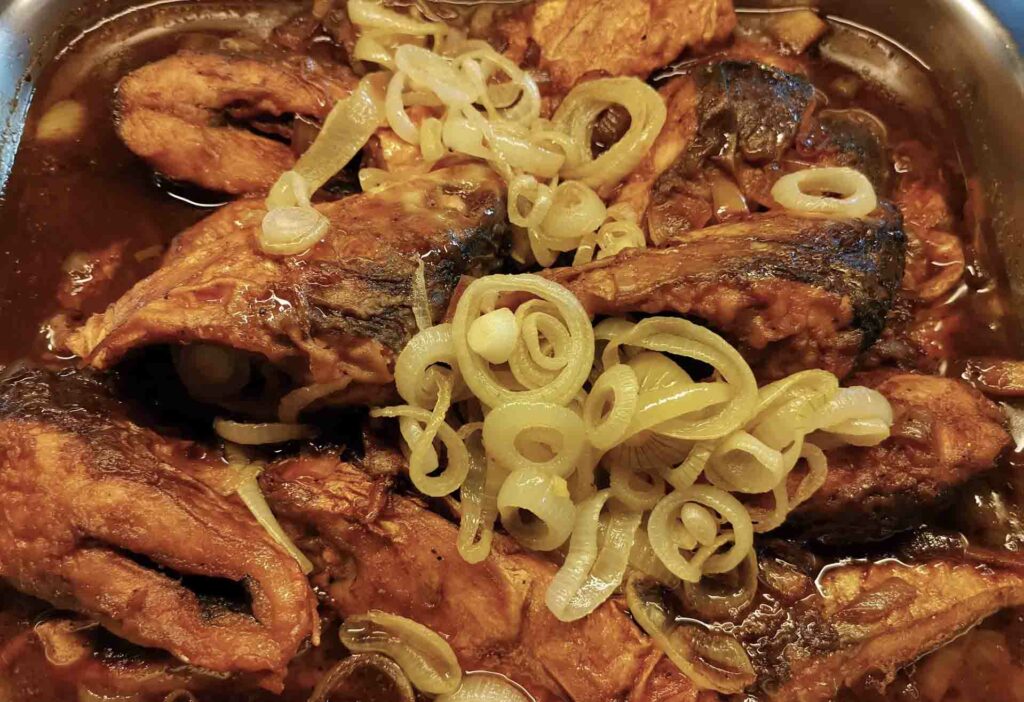 Filipino fish steak
Filipino fish steak
Image credit: Rav Man
There are a lot of Lent food dishes you can make out of tuna, and fish steak is one of those. We can safely assume that fishtek is the meatless version of Bistek (Beef steak stew) because of the identical way it is prepared.
For this dish, marinate whole tuna cuts or fillets in a mixture of soy sauce and calamansi juice. Then you’ll need to fry up some minced garlic in oil, add the tuna including the marinade, add a little bit of water, pepper, and red onion. Bring everything to a simmer and serve hot with rice.
With a tuna fishstek, you’ll get savory and meaty flavors without breaking the rules of Lent.
3. Paksiw – slow-cooked fish in vinegar, garlic, and ginger
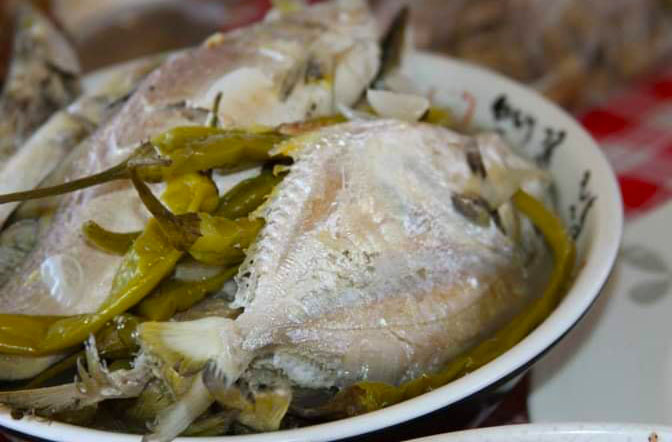 Sapsap paksiw
Sapsap paksiw
Image credit: Arsing Alejap
Paksiw is a dish with a clear broth soured with vegetables. It is less tart than the sinigang and allows more fish flavors to come through.
You can use any kind of fish for paksiw, but in this short recipe, we’ll use sapsap (pony fish). So, first, you’ll need to boil water with vinegar, and peppercorns. Next is to add the sapsap, thin slices of ginger, garlic, onion, siling haba (finger chilis), and chopped-up ampalaya (bitter gourd). After everything is in the pot, lower the heat, and let the whole dish simmer until the soup dries up a little bit. You can add patis (fish sauce) or salt to taste.
The fish paksiw has all the combined flavors of the sourness of the vinegar, the umami of the fish, the savoriness of the garlic, and the earthy flavor of ginger that’ll make you feel that you’re eating a well-balanced healthy meal.
4. Sarciado – fish with tomatoes and eggs
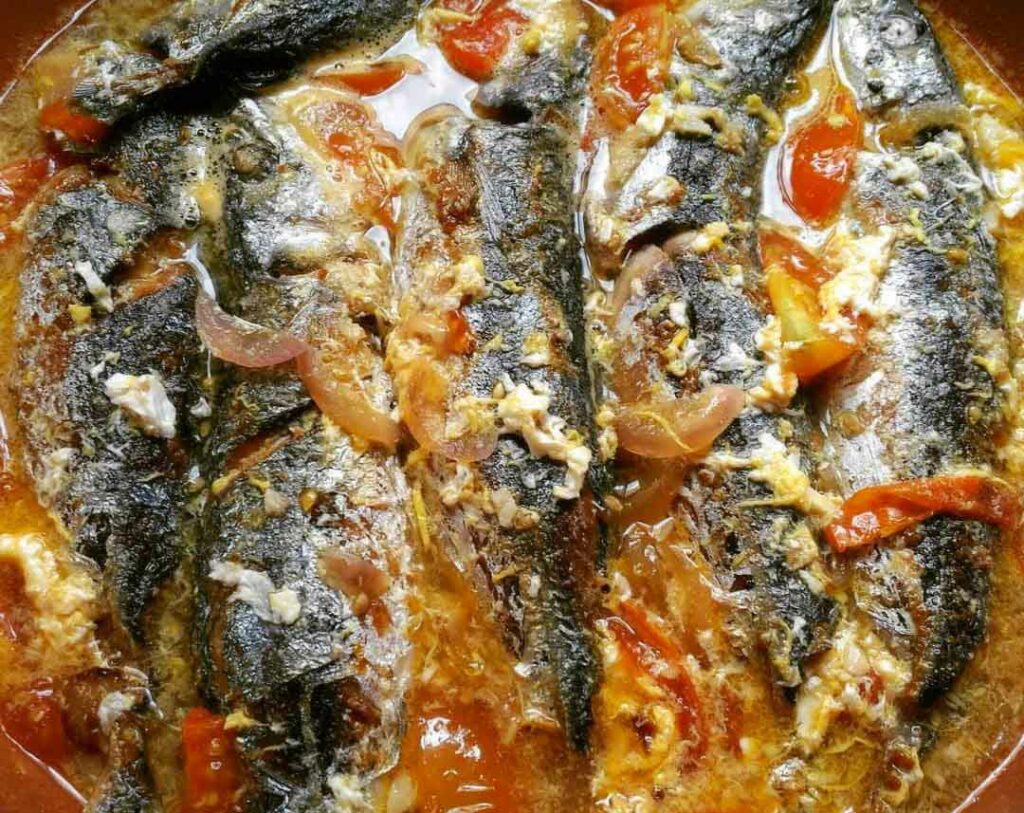 Galunggong Sarciado
Galunggong Sarciado
Image credit: Manila Central Market & Restaurant
Having young picky-eaters at home can sometimes make it harder for families to pick their ulam (viands), so we’re including sarsyadong isda (sarciado) in this list because kids tend to like tomato-based dishes.
The most common fish used for this dish is galunggong (blackfin scad). To cook sarciado, fry the fish first, then set it aside. Toss chopped tomatoes, garlic, and onion in hot oil, then add some water, fish sauce, tomato paste, and peppercorns. Bring everything to a boil, then mix in beaten eggs until it scrambles. Mix the fried fish with the sauce and you’ll have an amazing dinner.
5. Kinilaw – Filipino ceviche
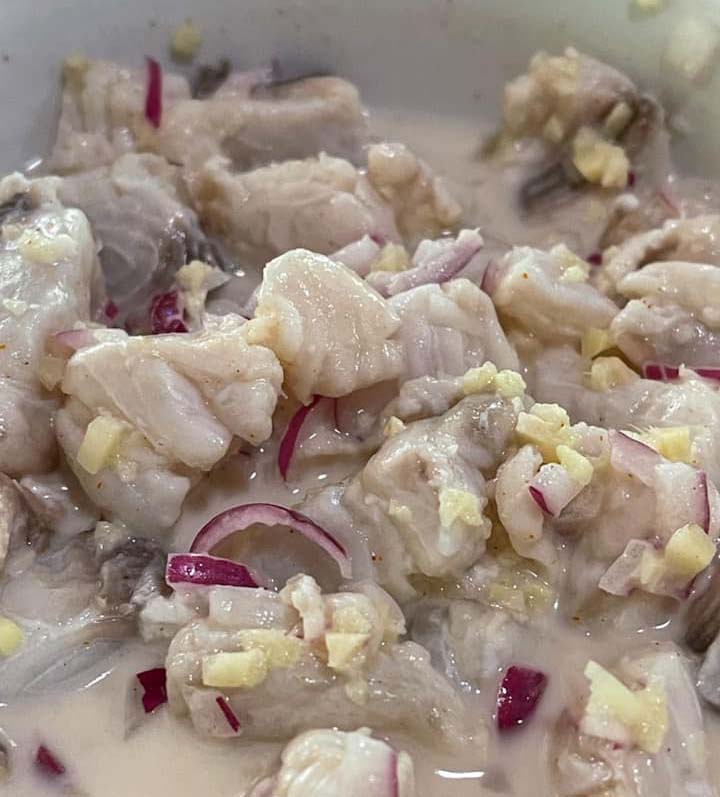
Tanigue Kinilaw
Image credit: Diana Limjoco
The key to a really good kinilaw is fresh fish, so it’s perfect for those living or on vacation near the coasts and why it’s a common ulam (viand) for fisherfolk.
If it isn’t obvious yet, you don’t really need to cook kinilaw. All you need to do is chop up a fresh fish fillet, such as tanigue (Spanish mackerel) and mix it in a bowl with minced ginger, red chilis, calamansi juice, sugar, pepper, and salt.
The focal point of kinilaw is the freshness of the fish, complemented by the slightly acidic and spicy mix of calamansi and red chilis. How to tell if the fish is fresh? Check the eyes, it should be bulgy, bright, and shiny. If the eyes are already red and sunken, move on to another fish.
– Vegetable-based Filipino food for Lenten season –
6. Monggo guisado – stir-fried mung beans
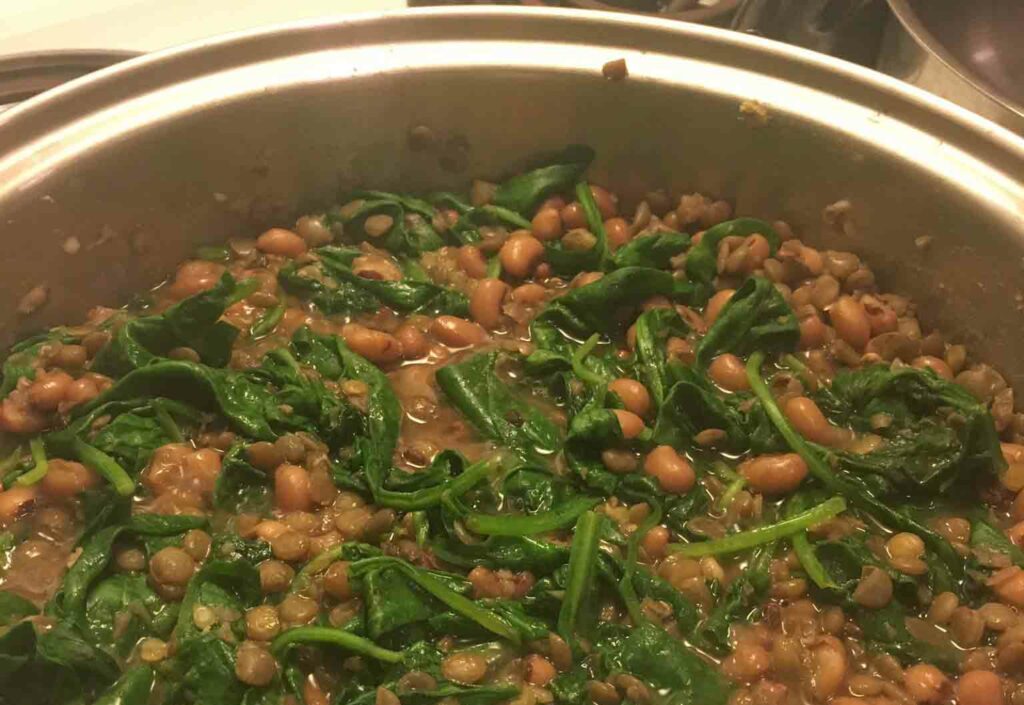
Vegan monggo guisado with lentils
Image credit: @eightofever
We’re unsure where the tradition started, but people associate monggo guisado with Fridays in Manila. Some say it’s because Lent’s 3-day commemoration of the Passion of Christ always begins on a Friday.
On regular days, this mung bean dish is always paired with pork bits and pork rinds, so of course, we’ll have to omit those during Lent. If you want to cook faster, soak the mung beans overnight, but if you can’t, just boil them for 35 minutes.
In another pan, fry up some minced garlic, onion, and tomatoes. You can choose to add daing (dried fish) or tinapa (smoked fish). Mix the pre-soaked or boiled mung beans, then stir fry with kangkong (water spinach) until cooked.
Monggo guisado will always have a special place in Filipino households because of its distinct homey flavors.
7. Laing – taro leaves in spicy coconut cream
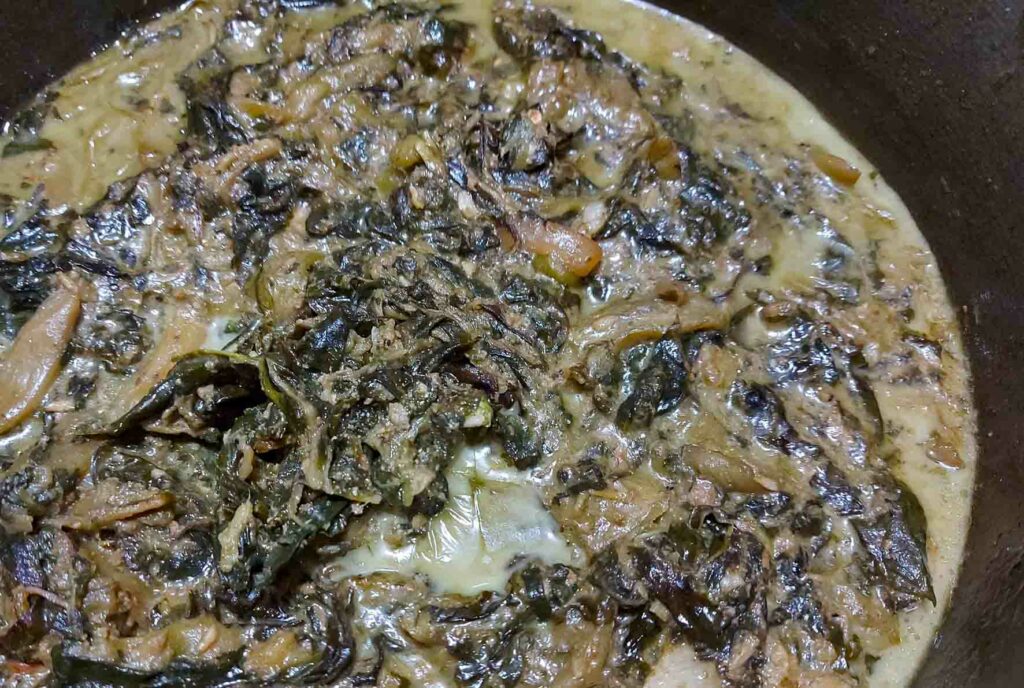
Laing
Image credit: Joice Alolor
The Bicol region in the Philippines is best known for two things— sili (chilis) and gata (coconut cream). Laing is the dish that represents both of those flavors perfectly.
Cooking a good laing relies on patience and timing rather than cooking skills. And so to start, put the coconut cream, ginger, onion, garlic, and bagoong (shrimp paste) in a pot over low heat and let it simmer. Occasionally, stir the pot so the other ingredients won’t stick on the bottom. Add in the dried taro leaves when the mixture boils, keeping it on low heat, cover the whole thing up, and let the taro leaves absorb all the liquid.
8. Ginisang Sayote – stir-fried Chayote in oyster sauce
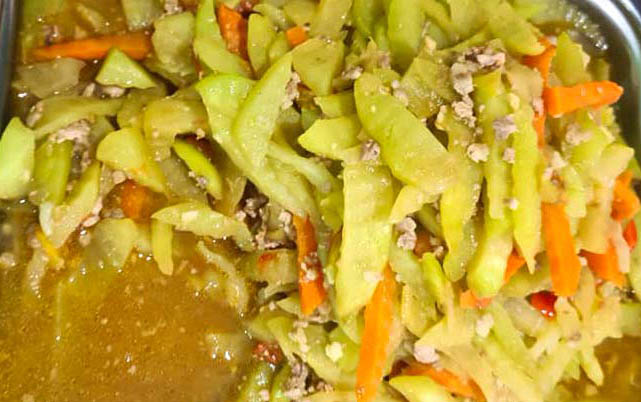
Stir-fried sayote
Image credit: Jho Pacardo
The sayote (chayote) is an inexpensive and easy-to-find vegetable that can be turned into really flavorful dishes— the easiest of which is ginisang sayote (stir-fried chayote).
All you need to do is to chop up tomatoes, garlic, onion and sauté it first, then add the sliced up sayote. Stir-fry the vegetables, then add a dollop of oyster sauce. If it’s not Lent, you can add ground pork or shrimp. This dish is easy to cook and is best paired with fried fish.
Lent food to enjoy this season
We know, these recipes are supposed to be a form of penance but it doesn’t mean you have to actually suffer. It’s wonderful to realize that the Philippines has such a rich and diverse culture which allows us to enjoy a slew of food for the Lenten season without pork, chicken, or beef.
Also check out our other food stories:
- Sachunsung in Ortigas & QC serves Korean noodles
- Poison Coffee and Doughnut in Makati
- 8 Spanish restaurants in Metro Manila
Cover image adapted from: The Roman Catholic Parish of the Holy Family, @xyzapaola, and @eightofever

Drop us your email so you won't miss the latest news.






